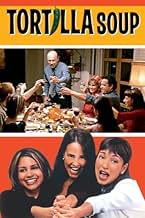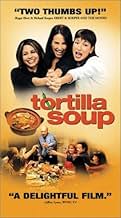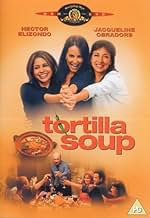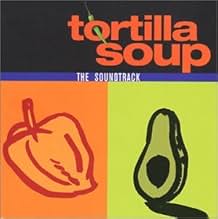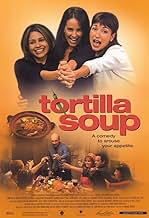Tortilla Soup
- 2001
- Tous publics
- 1h 42m
IMDb RATING
6.7/10
5.5K
YOUR RATING
A Mexican-American master chef and father to three daughters has lost his taste for food, but not for life.A Mexican-American master chef and father to three daughters has lost his taste for food, but not for life.A Mexican-American master chef and father to three daughters has lost his taste for food, but not for life.
- Awards
- 2 wins & 7 nominations total
Jude Herrera
- Eden
- (as a different name)
Featured reviews
You've got to wonder about a film that pitches its food as the star. Not that the dishes, prepared by the `Too Hot Tamales' Mary Sue Milliken and Susan Feniger, fall short of expectations. Tortilla Soup is rife with cooking and dinner scenes that feature both classic Mexican and Mexican fusion dishes. But nobody eats film, so the magnitude of the food's presen ce distracts from the story line. Or maybe the story line distracts from the story line.
Lying beneath it all, is a story about a family of Mexican-Americans and their abruptly changing lives. Hector Elizondo (Chicago Hope) is Martin Naranjo, a semi-retired chef and the father of three young women. Every Sunday his three daughters are required to join him for a grand meal, which he spends the day preparing. His eldest daughter Leticia, played by Elizabeth Pena, is a devout Christian and a schoolteacher. She's the daddy's girl. The middle child Carmen (Jacqueline Obradors) is a successful executive, with an eccentric style of cooking that aggravates her father. The youngest daughter Maribel (Tamara Mello, She's All That) is a fun loving high school student that longs to see the world. Soon Leticia starts receiving love letters, Carmen gets offered a job in Barcelona, and Maribel decides to run off with her new boyfriend. Nothing is as it once was. People begin to miss Sunday dinner, which aggravates Martin, whose taste is dead and health may be failing. Martin decides to fill his new free time with the courtship of the mother of a family friend. Hortensia (Raquel Welch) seeks Martin as her fourth husband.
The dining scenes are extensive, acting as segues into the major conversations in the film. The cooking scenes battle the dialogue for time on the screen. The soundtrack, most audible when food is either being prepared or being eaten, turns out to be the hidden star of Tortilla Soup. It's light Latino fare, showcasing `Si En Un Final' by Eliades Ochoa of the Buena Vista Social Club and a Spanglish version of `Perhaps, Perhaps, Perhaps,' by Lila Downs. It's a warm fuzzy moment when the girls sing a song together during post-dinner KP duty. That's what sisterhood is all about. It's about the love, the support, and the cleaning.
Everything seems to work out for the characters, as they often do in movies. I'm not going to give anything away, but I will say that it involves both `living happily' and `forever after.' There's a twist, which the written documents sponsored by the film all boast as unpredictable, and this can be attributed to its lack of support throughout the film. The cast, despite a high level of talent, fails to perk up dialogue that teeters on the edge of cheesy. In one scene, Leticia and Carmen discuss their father's disdain for Christianity. Martin, a Catholic, feels that Christians worship Christ, rather than Christianity as a whole. Carmen mentions that Christ was a Christian, and both girls are surprised when the hairdresser reminds them that Christ was a Jew. Wouldn't the `devout' Leticia have known that?
One of the more tactfully placed cultural snippets is the persistent use of Spanglish, the Spanish/English hybrid, which Martin shuns. His demands for either English or Spanish to be spoken in his household serves the character well, reinforcing the juxtaposition of Martin's loyalty to tradition and his Americanization of the daughters. A great deal of Tortilla Soup seeks to enrich the audience with factual knowledge about Hispanic culture and religion, but most of it is presented it so conspicuously as to make it appear forced and excessive.
The film's saving grace is the relationships between the characters. While the characters as individuals are peppered with stereotyping, the entire Naranjo family and their friends blend together nicely. Through thick and thin, sisters are sisters, and offer each other unwavering support. Their father, who struggles with his own faults, seeks to find the line between helping and suffocating his children. As his family changes, so must he, and for a man seeped in tradition, change comes slowly. Martin is aided through this transition by the hand of a young girl, a daughter of a friend, whom he visits at school daily to bring a home cooked lunch. The young girl quells Martin's empty nest syndrome and also plays a roll in the `surprise' ending. And that's the best hint you'll get the whole movie.
It's difficult to say whom Tortilla Soup was written for. It's rated PG-13 for sexual content, but it leans toward PG. It's really a family movie, a daytime matinee. Maybe something to do in the afternoon before having a nice sociable dinner. Then again, the food in the film looks so good, dinner will probably be a disappointment. Directed by Maria Ripoll. 102 Min. Rated PG-13.
Lying beneath it all, is a story about a family of Mexican-Americans and their abruptly changing lives. Hector Elizondo (Chicago Hope) is Martin Naranjo, a semi-retired chef and the father of three young women. Every Sunday his three daughters are required to join him for a grand meal, which he spends the day preparing. His eldest daughter Leticia, played by Elizabeth Pena, is a devout Christian and a schoolteacher. She's the daddy's girl. The middle child Carmen (Jacqueline Obradors) is a successful executive, with an eccentric style of cooking that aggravates her father. The youngest daughter Maribel (Tamara Mello, She's All That) is a fun loving high school student that longs to see the world. Soon Leticia starts receiving love letters, Carmen gets offered a job in Barcelona, and Maribel decides to run off with her new boyfriend. Nothing is as it once was. People begin to miss Sunday dinner, which aggravates Martin, whose taste is dead and health may be failing. Martin decides to fill his new free time with the courtship of the mother of a family friend. Hortensia (Raquel Welch) seeks Martin as her fourth husband.
The dining scenes are extensive, acting as segues into the major conversations in the film. The cooking scenes battle the dialogue for time on the screen. The soundtrack, most audible when food is either being prepared or being eaten, turns out to be the hidden star of Tortilla Soup. It's light Latino fare, showcasing `Si En Un Final' by Eliades Ochoa of the Buena Vista Social Club and a Spanglish version of `Perhaps, Perhaps, Perhaps,' by Lila Downs. It's a warm fuzzy moment when the girls sing a song together during post-dinner KP duty. That's what sisterhood is all about. It's about the love, the support, and the cleaning.
Everything seems to work out for the characters, as they often do in movies. I'm not going to give anything away, but I will say that it involves both `living happily' and `forever after.' There's a twist, which the written documents sponsored by the film all boast as unpredictable, and this can be attributed to its lack of support throughout the film. The cast, despite a high level of talent, fails to perk up dialogue that teeters on the edge of cheesy. In one scene, Leticia and Carmen discuss their father's disdain for Christianity. Martin, a Catholic, feels that Christians worship Christ, rather than Christianity as a whole. Carmen mentions that Christ was a Christian, and both girls are surprised when the hairdresser reminds them that Christ was a Jew. Wouldn't the `devout' Leticia have known that?
One of the more tactfully placed cultural snippets is the persistent use of Spanglish, the Spanish/English hybrid, which Martin shuns. His demands for either English or Spanish to be spoken in his household serves the character well, reinforcing the juxtaposition of Martin's loyalty to tradition and his Americanization of the daughters. A great deal of Tortilla Soup seeks to enrich the audience with factual knowledge about Hispanic culture and religion, but most of it is presented it so conspicuously as to make it appear forced and excessive.
The film's saving grace is the relationships between the characters. While the characters as individuals are peppered with stereotyping, the entire Naranjo family and their friends blend together nicely. Through thick and thin, sisters are sisters, and offer each other unwavering support. Their father, who struggles with his own faults, seeks to find the line between helping and suffocating his children. As his family changes, so must he, and for a man seeped in tradition, change comes slowly. Martin is aided through this transition by the hand of a young girl, a daughter of a friend, whom he visits at school daily to bring a home cooked lunch. The young girl quells Martin's empty nest syndrome and also plays a roll in the `surprise' ending. And that's the best hint you'll get the whole movie.
It's difficult to say whom Tortilla Soup was written for. It's rated PG-13 for sexual content, but it leans toward PG. It's really a family movie, a daytime matinee. Maybe something to do in the afternoon before having a nice sociable dinner. Then again, the food in the film looks so good, dinner will probably be a disappointment. Directed by Maria Ripoll. 102 Min. Rated PG-13.
Well, well, it's hard to describe this film. Sometimes you always feel good when you're watching a film. I don't know exactly the reason. I just know that in some occasions you fell not so good because of the events that occur in one film. Here it's about feeling good.
It's very comforting to see Hector Elizondo here. I have always liked him. And I have never thought of his acting qualities, or evaluated him as an actor, I just have always had fun watching him on screen. This movie is no exception. I gotta give him the fact that he actually looks like a cook (chef). He actually seems to enjoy the meals he prepares daily. And also seems his family, people who love him. And there wouldn't be much a film without this love.
Martin's (Elizondo) three daughters are the center of the film, of course, including their dad. Tamara Bello is beautiful. It's the first time I see her in a movie, but there's such charm in her face, and she makes Maribel the kind of girl some teenagers may identify with.
Leticia (Peña) is also some kind of misteryous, but understandable. We get her situation, and maybe know there's no way out. But we are also by her side, when she has the time to improve. She has kept his feelings for too long, as if she was obliged to, and know she's desperate to let them go.
Carmen (Obradors) might be the opposite. She has let her feelings go, but has kept some of them inside also. It is like she knows she must take some decisions, and she takes them, only she may not be so sure, she may just think she is.
The rest of the actors are perfect choices, and make each of the characters they play another part of this charming film.
I'm hungry...
It's very comforting to see Hector Elizondo here. I have always liked him. And I have never thought of his acting qualities, or evaluated him as an actor, I just have always had fun watching him on screen. This movie is no exception. I gotta give him the fact that he actually looks like a cook (chef). He actually seems to enjoy the meals he prepares daily. And also seems his family, people who love him. And there wouldn't be much a film without this love.
Martin's (Elizondo) three daughters are the center of the film, of course, including their dad. Tamara Bello is beautiful. It's the first time I see her in a movie, but there's such charm in her face, and she makes Maribel the kind of girl some teenagers may identify with.
Leticia (Peña) is also some kind of misteryous, but understandable. We get her situation, and maybe know there's no way out. But we are also by her side, when she has the time to improve. She has kept his feelings for too long, as if she was obliged to, and know she's desperate to let them go.
Carmen (Obradors) might be the opposite. She has let her feelings go, but has kept some of them inside also. It is like she knows she must take some decisions, and she takes them, only she may not be so sure, she may just think she is.
The rest of the actors are perfect choices, and make each of the characters they play another part of this charming film.
I'm hungry...
This has a wonderful plot. The father of grown daughters suffers the generational clash and cultural clash of old vs. new. This is an hispanic (but English language)remake of the Chinese film "Eat Drink, Man, Women". Both show the writing credits of Ang Lee. This falls far short of the original.
I saw "Eat, Drink..." a few years ago. Although, my wife tends to dislike subtitled movies, she tolerated this one for me. We both loved it. It was well written, directed and acted. "Tortilla Soup" is an ok movie, but failed to keep my attention in the same way that "Eat, Drink..." did. The acting was OK. The direction seemed ok as well. I can't put my finger on why, exactly, but this movie just isn't as good.
Unless you absolutely refuse to view subtitled movies, definitely forego this in favor of "Eat, Drink, Man, Women".
I saw "Eat, Drink..." a few years ago. Although, my wife tends to dislike subtitled movies, she tolerated this one for me. We both loved it. It was well written, directed and acted. "Tortilla Soup" is an ok movie, but failed to keep my attention in the same way that "Eat, Drink..." did. The acting was OK. The direction seemed ok as well. I can't put my finger on why, exactly, but this movie just isn't as good.
Unless you absolutely refuse to view subtitled movies, definitely forego this in favor of "Eat, Drink, Man, Women".
Better than the ordinary Hollywood movie, this family comedy does a very nice job of presenting a variety of characters in the throes of pursuing their own version of the American Dream. That the family is Mexican-American adds a welcome difference. The camera loves the food being prepared, the Latin-flavored music score enlivens the proceedings, and the acting is quite serviceable. Jacqueline Obrador and Elizabeth Pena shine as the older daughters in the family, the always-reliable Hector Elizondo is fine in a rare leading role. Of greatest interest, however, may be Raquel Welch, playing her age and her ethnicity for the first time in my memory. It is her role, not her performance, that mars the movie. She is a caricature of an older-middle-aged unattached woman, the butt of unkind jokes. And it is the unwitting bias toward the older woman character that undermines the otherwise upbeat, happy ending intended. Still, this one's worth the cost of a rental. Not great art but at least it doesn't insult the viewers' intelligence.
This is an exact almost word for word copy of Eat Drink Man Woman, a 1994 Twainese production. Both movies are great, but Tortilla soup looses points for lack of originality.
Both movies offer sharp portrayals of their various cuisines, and your preference may be Mexican vs.Chinese, however if you can tolerate the fast pace Chinese dialog (subtitles), see the original first. I also preferred the scenery of the original (Eat Drink Man Woman), but perhaps that is because Taiwan is the orient and the architecture is spectacular.
Finally, both movies are well acted although the lifestyle portrayed in the story line may be somewhat more believable in the Southern California setting of Tortilla Soup.
Both movies offer sharp portrayals of their various cuisines, and your preference may be Mexican vs.Chinese, however if you can tolerate the fast pace Chinese dialog (subtitles), see the original first. I also preferred the scenery of the original (Eat Drink Man Woman), but perhaps that is because Taiwan is the orient and the architecture is spectacular.
Finally, both movies are well acted although the lifestyle portrayed in the story line may be somewhat more believable in the Southern California setting of Tortilla Soup.
Did you know
- TriviaThe plot of this movie is a Hispanic version of Eat Drink Man Woman (1994), about an aging widower chef who raised three daughters alone, both being written by Ang Lee. Even the opening crisis, the restaurant previously run by the chef has ruined the main feature of a huge banquet and he is called in to save the day, is the same.
- GoofsAt the end when Carmen is leaving the kitchen to serve her family, at first she has one plate without the lobster, then when she is leaving the kitchen, as she is turning the corner, she has the plate with a lobster. Then, coming out of the kitchen, the lobster has disappeared, then reappears again when she turns towards the tables.
- Quotes
Carmen Naranjo: Do you know why we clink glasses before drinking?... It's so that all the five senses are involved. We touch the glass. We smell the drink. We see its color. We taste it. Hearing is the only sense that doesn't participate unless we create it.
- How long is Tortilla Soup?Powered by Alexa
Details
- Release date
- Country of origin
- Official site
- Languages
- Also known as
- Cocinando La Vida
- Filming locations
- Marshall Fundamental Secondary School - 990 Allen Avenue, Pasadena, California, USA(School where Leticia Naranjo teaches)
- Production companies
- See more company credits at IMDbPro
Box office
- Gross US & Canada
- $4,467,615
- Opening weekend US & Canada
- $653,729
- Aug 26, 2001
- Gross worldwide
- $4,634,077
Contribute to this page
Suggest an edit or add missing content









